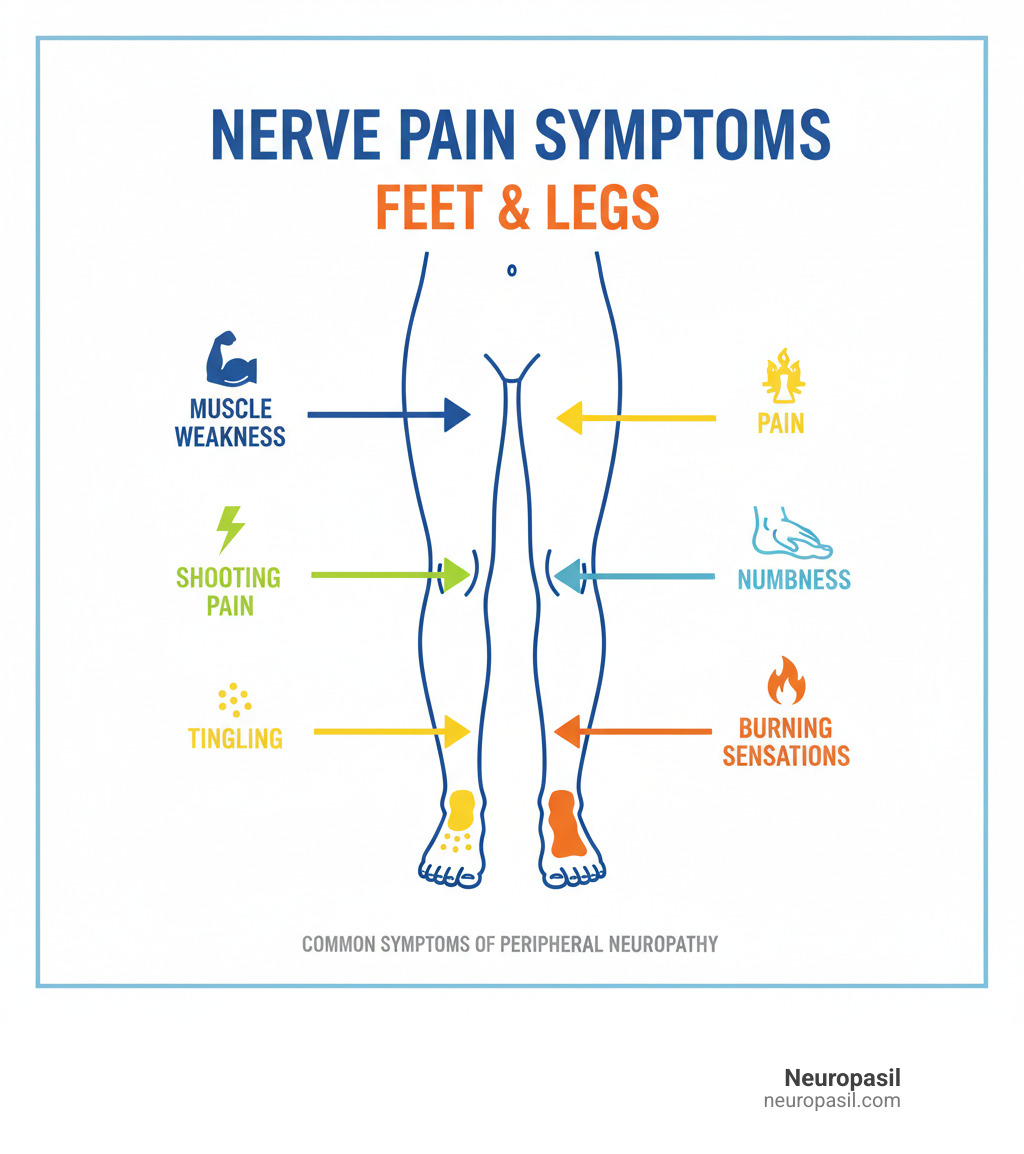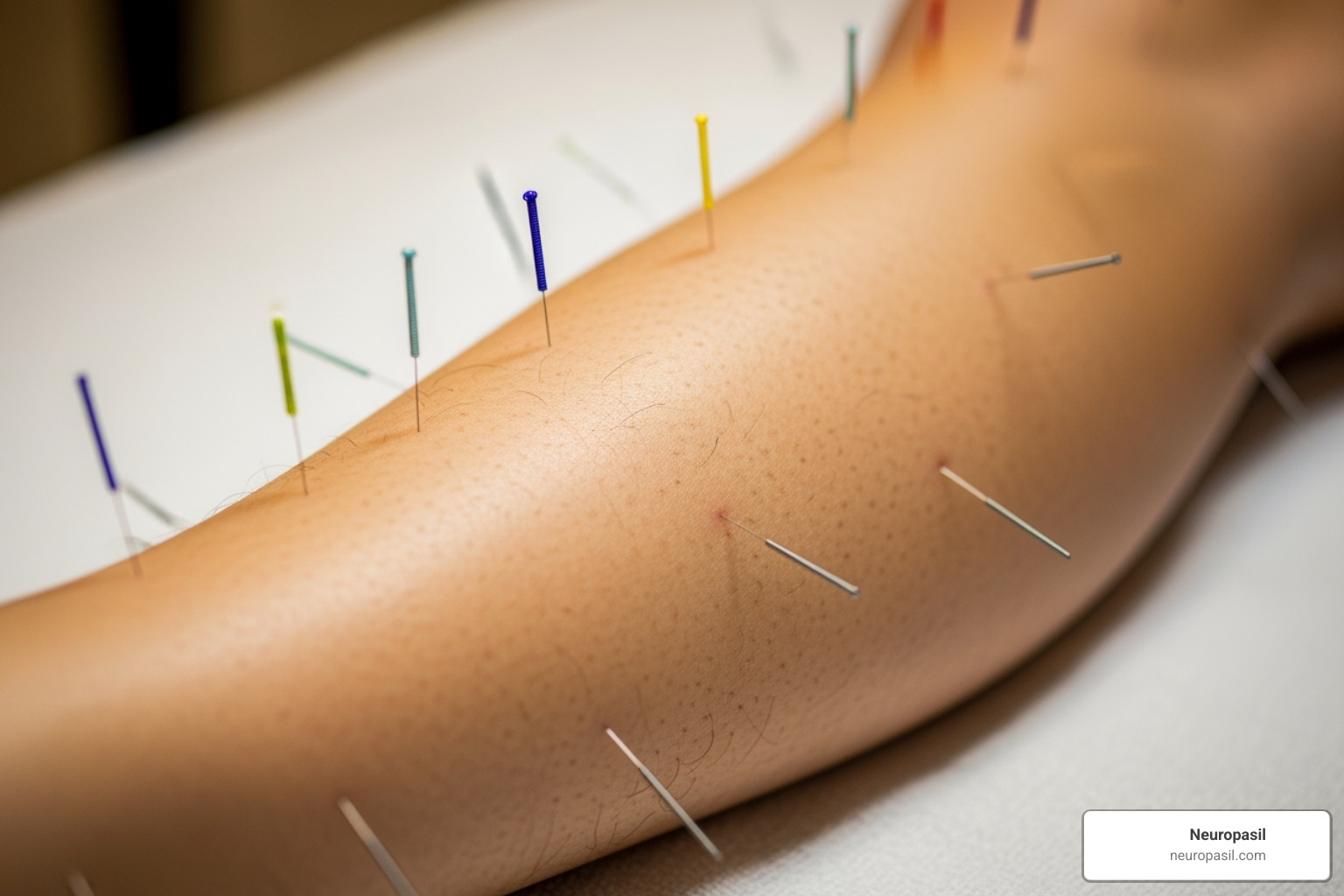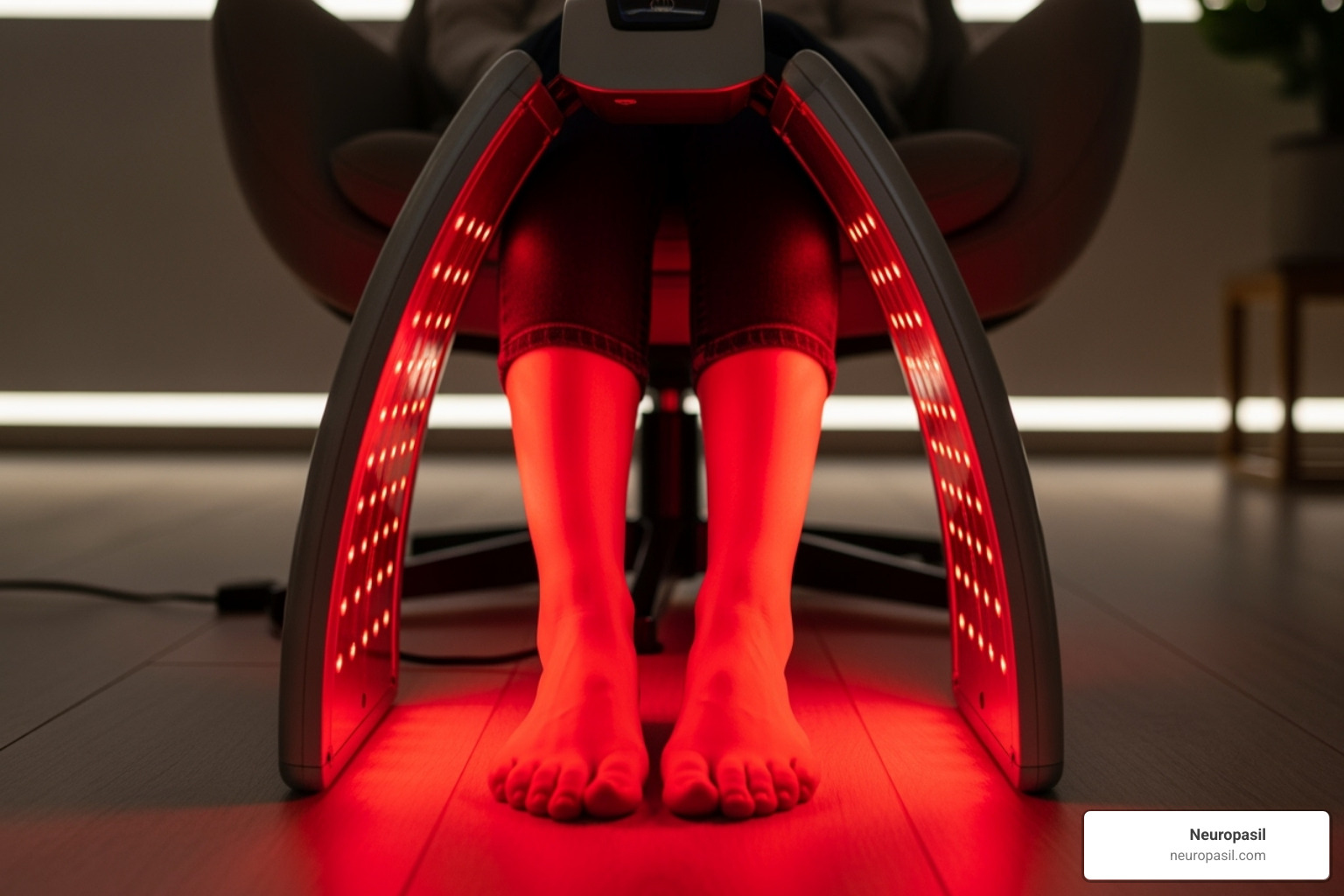Why Home Remedies Are Your First Line of Defense Against Nerve Pain
Home remedies for nerve pain in feet and legs can provide significant relief without the side effects or high costs of prescription medications. Whether you're dealing with burning, tingling, numbness, or shooting pain, simple at-home treatments often work as well as expensive clinical options.
Quick Relief Options:
- Warm Epsom salt soaks - 15-20 minutes daily to improve circulation
- Cold therapy - Ice packs for 15 minutes to numb acute pain
- Gentle massage - Stimulates blood flow and reduces muscle tension
- Compression socks - Reduce swelling and improve circulation
- Anti-inflammatory supplements - Turmeric, fish oil, and B vitamins
- Topical treatments - Capsaicin or lidocaine creams for direct relief
Peripheral neuropathy affects 1 in 3 people globally, causing symptoms that range from mild tingling to debilitating pain. The most common culprits include diabetes, vitamin deficiencies, injuries, and excessive alcohol use.
Research shows that regular exercise can lower neuropathy pain while improving muscle strength and blood sugar control. Warm water increases blood circulation, decreasing pain from numbness. Even meditation techniques can help lower stress and decrease pain intensity.
The good news? Many effective treatments are probably already in your medicine cabinet or kitchen. From targeted stretches to strategic nutrition, these evidence-based remedies can help you regain control over your comfort - no prescription required.

Understanding Nerve Pain in Your Feet and Legs
When your feet and legs start sending you pain signals that feel like burning, tingling, numbness, or sharp shooting sensations, your nerves are trying to tell you something important. This type of discomfort is often a sign of peripheral neuropathy - a condition where the nerves that connect your brain and spinal cord to your extremities become damaged or irritated.
When these nerves get damaged, the messages get scrambled, resulting in uncomfortable sensations that can range from mildly annoying to downright debilitating. Understanding what causes this nerve damage is the first step toward finding effective home remedies for nerve pain in feet and legs.
Diabetes stands as the leading culprit behind nerve pain in the feet and legs. When blood sugar levels remain high over time, they can damage the delicate nerve fibers throughout your body. This condition, known as diabetic neuropathy, affects millions of people worldwide. The tricky part about diabetic nerve damage is that it can reduce your ability to feel pain, making your feet more vulnerable to injuries you might not even notice.
Vitamin deficiencies are another common cause of nerve pain, as nerves need specific nutrients to function properly. B12 deficiency is particularly notorious for causing nerve problems, along with shortages of B6 deficiency, thiamine (B1), and vitamin E. Even having too little or too much calcium and magnesium can throw your nerve function off balance.
Physical trauma can also disrupt your nerve pathways. Whether it's a sprained ankle that never quite healed right, a fracture that damaged surrounding nerves, or even repetitive stress from activities like running, peripheral nerve injury can create lasting pain. Sometimes the damage happens gradually through chronic compression - like wearing shoes that don't fit properly for years.
Alcohol use affects nerve health in ways many people don't realize. Excessive drinking doesn't just damage your liver; it also interferes with your body's ability to absorb those crucial B vitamins your nerves need to stay healthy. Over time, this can lead to alcoholic neuropathy, which causes many of the same symptoms as diabetic nerve damage.
Neuromas are areas where nerve tissue has become thickened, often between your toes. Morton's neuroma is the most common type, creating a sensation like you're walking on a pebble or marble. The thickened tissue presses on surrounding nerves, causing sharp or burning pain that can make every step uncomfortable.
Sciatica takes a different approach to causing leg and foot pain. Your sciatic nerve is the longest nerve in your body, running from your lower back all the way down to your toes. When this nerve gets compressed or irritated - often due to a herniated disc or tight muscles - the pain can radiate down your entire leg. You can learn more about managing sciatic nerve pain through targeted approaches.
The symptoms you experience depend on which type of nerves are affected. Sensory nerve damage typically causes the burning, tingling, and numbness we associate with neuropathy. Motor nerve damage might make your muscles feel weak or cause them to cramp unexpectedly. Autonomic nerve damage can affect functions you don't normally think about, like sweating or blood pressure regulation.
Understanding these peripheral neuropathy symptoms helps you make sense of what your body is experiencing and choose the most appropriate remedies. The good news is that once you identify the likely cause of your nerve pain, you can start taking targeted action to find relief right at home.
Top Home Remedies for Nerve Pain in Feet and Legs
When nerve pain strikes, many effective home remedies for nerve pain in feet and legs can provide significant relief. These natural approaches work by improving circulation, reducing inflammation, and supporting your body's healing processes.
Home remedies are accessible and gentle. Unlike prescriptions, which can have side effects, natural treatments work with your body. Many also address multiple aspects of nerve pain, which is helpful for complex conditions like peripheral neuropathy.
Soothing Physical Therapies for Immediate Relief
Sometimes your aching feet and legs just need some immediate, hands-on care. These physical therapies can often provide relief within minutes, making them perfect for those moments when nerve pain flares up unexpectedly.
Warm water foot soaks with Epsom salt can be very therapeutic. The warm water naturally increases blood circulation throughout your feet and legs, which helps reduce the numbness and tingling that often accompany nerve damage. Research on warm salt water baths shows genuine benefits for pain relief.

The Epsom salt (magnesium sulfate) adds an extra layer of healing. Your skin can actually absorb magnesium, which helps relax muscles and may support nerve function. Aim for a 15-20 minute soak daily, but always test the water temperature carefully - especially if you have reduced sensation in your feet.
When sharp, shooting pain hits, cold therapy can be incredibly effective. Ice packs work by numbing the area and reducing inflammation that might be pressing on your nerves. Wrap an ice pack in a thin towel and apply it for 15-20 minutes. It's particularly helpful for sudden flare-ups or newer injuries.
Foot massage is another excellent home remedy. You can do it yourself or ask a family member for help. Gentle massage improves blood flow, reduces muscle tension that might be compressing nerves, and provides direct pain relief. Use your hands, a tennis ball, or a foot roller, but be gentle to encourage healing.
Compression socks offer continuous, gentle support throughout your day. They help reduce swelling and improve circulation by gently squeezing your legs and feet. Look for socks specifically designed for neuropathy - they're usually seamless and made with moisture-wicking materials that won't irritate sensitive skin.
For times when movement makes your pain worse, a foot brace or splint can provide the stability you need. These devices support your foot and ankle, reducing stress on irritated nerves. Many effective options are available over-the-counter, so you don't necessarily need a doctor's prescription to get started.
Lifestyle Adjustments: More Home Remedies for Nerve Pain in Feet and Legs
The most powerful remedies often come from the daily choices we make. These lifestyle changes might seem simple, but they can dramatically impact your nerve pain over time.
Gentle exercise stands out as one of the most effective long-term treatments. You don't need to run marathons - even a daily walk can make a huge difference. Exercise and neuropathic pain research shows that regular activity can significantly reduce nerve pain while improving muscle strength and blood sugar control.
Walking is perfect because it's low-impact and improves circulation. Stretching helps maintain flexibility and can relieve muscle tension that contributes to nerve compression. If you're dealing with foot pain, specific Exercises For Plantar Fasciitis can improve overall foot health and reduce nerve irritation.
If you smoke, quitting is one of the best gifts you can give your nerves. Smoking restricts blood vessels and reduces the flow of oxygen-rich blood to your extremities. Without proper circulation, nerve pain often gets worse. The effects of smoking on circulation are well-documented, and the good news is that circulation improvements can begin within weeks of quitting.
Limiting alcohol is equally important. Excessive drinking interferes with your body's ability to absorb essential B vitamins that your nerves need to function properly. Even if alcohol isn't the original cause of your nerve pain, it can definitely make existing symptoms worse.
Stress management might seem unrelated to foot pain, but your mind and body are deeply connected. Chronic stress releases hormones that increase inflammation and make you more sensitive to pain. Meditation and deep breathing exercises can help break this cycle. Mindfulness for pain relief research shows real benefits for people living with chronic pain conditions.
Good sleep hygiene becomes crucial when you're dealing with nerve pain. Pain can disrupt sleep, and poor sleep makes pain worse - it's a frustrating cycle. Establish a regular bedtime routine, avoid caffeine late in the day, and create a comfortable sleep environment. If nerve pain keeps you awake, try wearing loose-fitting socks or using a bed cradle to keep covers off sensitive feet.
Proper footwear can make or break your day when you have nerve pain. Supportive shoes distribute your weight evenly and provide cushioning where you need it most. Look for shoes with wide toe boxes, good arch support, and low heels. For specific conditions, specialized Plantar Fasciitis Shoes can provide targeted relief.
Supplements and Topical Home Remedies for Nerve Pain in Feet and Legs
Sometimes your body needs extra nutritional support to heal damaged nerves, or you might benefit from targeted topical treatments that work directly where it hurts.

Vitamin B-complex supplements address one of the most common causes of nerve pain - nutritional deficiencies. Your nerves need adequate B1 (thiamine), B6, and especially B12 to function properly. These vitamins support nerve health and can help repair existing damage. If you've been dealing with unexplained nerve pain, a B-complex supplement might be exactly what your body needs.
Vitamin E acts as a powerful antioxidant, protecting your nerves from further damage. Magnesium and calcium work together to support proper nerve signaling - having too little or too much of either can contribute to neuropathy symptoms.
Turmeric deserves special recognition among home remedies for nerve pain in feet and legs. The active compound curcumin has powerful anti-inflammatory properties. Curcumin for analgesia research shows promising results for pain relief. You can take turmeric supplements or incorporate the spice into your cooking.
Fish oil provides omega-3 fatty acids that help reduce inflammation throughout your body. Fish oil for diabetic neuropathy studies suggest it may be particularly helpful for people with diabetes-related nerve pain.
Ginger offers both anti-inflammatory and pain-relieving properties. You can enjoy it as tea, add fresh ginger to your meals, or take it in supplement form.
For direct, localized relief, topical capsaicin cream can be remarkably effective. Made from chili peppers, it works by depleting the chemical messengers that send pain signals to your brain. Just remember to wash your hands thoroughly after applying and avoid contact with your eyes.
Topical lidocaine creams or patches provide numbing relief by blocking pain signals at the skin level. They're particularly useful for areas of sharp, burning pain. You might find similar benefits from specialized Cream For Tendonitis formulations that contain numbing agents.
While over-the-counter pain relievers like ibuprofen or acetaminophen can provide some relief, nerve pain often doesn't respond as well to these medications as other types of pain do. They're worth trying for mild symptoms, but don't be discouraged if they don't provide complete relief - that's normal with neuropathic pain.
Alternative Therapies and When to See a Doctor
When home remedies need a backup, alternative approaches can be surprisingly effective. These complementary therapies have helped people for centuries, and modern research is now catching up.
Acupuncture is gaining recognition for good reason. This ancient practice involves placing ultra-thin needles at specific points on your body to encourage natural healing and release the body's own pain-fighting chemicals. Research on acupuncture for peripheral neuropathy shows promising results for reducing nerve pain, though scientists are still working to understand exactly how it works. Many people find it surprisingly relaxing.

Essential oils can be wonderful additions to your home remedies for nerve pain in feet and legs toolkit, especially when combined with gentle massage. Lavender oil is famous for its calming properties, while Peppermint oil provides a cooling sensation that many find soothing for burning nerve pain. Other oils like eucalyptus, bergamot, and nutmeg are also getting attention from researchers.
Here's the important part: never use essential oils straight on your skin! Always mix them with carrier oils like coconut, jojoba, or olive oil first. A good rule of thumb is just a few drops of essential oil per tablespoon of carrier oil. And please do a patch test on a small area of skin first to avoid an allergic reaction.
Red light therapy might sound like something from a sci-fi movie, but it's a legitimate treatment gaining serious attention. This therapy uses specific wavelengths of red and near-infrared light to give your cells an energy boost. The light penetrates your skin and encourages your nerve cells to heal and regenerate faster. The therapy can improve blood flow, reduce inflammation, and even protect your nerves from further damage by stimulating cells that help repair nerve tissue.

When to Seek Professional Medical Help
It's also important to know when your home remedies for nerve pain in feet and legs need professional backup. While natural treatments can work wonders, sometimes your body is trying to tell you something that needs a doctor's attention.
Worsening pain is your first red flag. If your discomfort keeps getting worse despite trying various home remedies, it's time to call in the experts. Your pain shouldn't be getting progressively more intense or unmanageable.
Pay special attention to spreading numbness or any unexplained weakness in your feet or legs. If the tingling or numbness starts creeping up your leg or if you suddenly find it hard to lift your foot or toes, don't wait. These could be signs that nerve damage is progressing.
Signs of infection require immediate medical attention, especially if you have diabetes. Look for redness, swelling, warmth, or any discharge around the affected area. When you have nerve damage, you might not feel injuries as easily, which means infections can sneak up on you.
Sudden onset of severe nerve pain without any clear cause is another "see a doctor now" situation. Pain that appears out of nowhere and hits hard could indicate something more serious happening.
If your nerve pain is significantly impacting your daily life—making it hard to walk, keeping you awake at night, or preventing you from doing things you enjoy—professional help can offer stronger treatment options.
Finally, if you have underlying conditions like diabetes, HIV, or cancer, any new or changing nerve pain deserves medical attention. These conditions can complicate nerve pain, and your doctor needs to know about changes to adjust your overall treatment plan.
Seeking professional help doesn't mean your home remedies have failed. Often, the best approach combines both natural treatments and medical care, giving you the most comprehensive relief possible.
Frequently Asked Questions about Nerve Pain in the Feet
Living with nerve pain brings up many questions. Let's tackle some of the most common concerns people have when dealing with home remedies for nerve pain in feet and legs.
How do you sleep with nerve pain in your feet?
Trying to sleep when your feet are in pain is a common struggle. It's frustrating to toss and turn, trying to find a comfortable position that doesn't make everything worse.
The key to better sleep starts with optimizing your sleep hygiene. This means sticking to a consistent bedtime routine, keeping your bedroom cool and dark, and avoiding screens before bed. The blue light can mess with your natural sleep cycle, which is crucial when nerve pain is involved.
Loose-fitting cotton socks can be helpful at bedtime, providing warmth and comfort without squeezing your feet. Some people prefer keeping their feet uncovered, while others find relief by elevating their feet slightly with a pillow.
A bed cradle—a frame that keeps blankets off your feet—can be a game-changer if even the weight of sheets feels unbearable. Don't underestimate the power of relaxation techniques like deep breathing or progressive muscle relaxation to calm your mind and body.
What is the best foot soak for neuropathy?
For neuropathy relief, a warm water soak with Epsom salts is one of the most effective home remedies for nerve pain in feet and legs.
The warm water increases blood circulation throughout your feet and legs, helping to ease nagging numbness and pain. Add about half a cup of Epsom salts to your basin; your skin absorbs the magnesium, which can help relax muscles and reduce inflammation.
For an added boost, a few drops of peppermint oil can provide a cooling sensation, while chamomile oil offers calming properties. Just remember to dilute these essential oils in a carrier oil first.
Most importantly, always test the water temperature with your elbow before soaking, especially if neuropathy has reduced sensation in your feet. You want it warm and comforting, not scalding. Aim for a relaxing 15-20 minute soak.
Can massage help with foot nerve pain?
Absolutely! Gentle massage can significantly help with foot nerve pain by improving blood flow, releasing muscle tension, and providing direct relief where you need it most.
When you massage your feet, you're stimulating blood circulation to areas that might not be getting enough nourishment. This increased blood flow delivers oxygen and nutrients to damaged nerves while carrying away waste products that contribute to discomfort.
Tight muscles can compress nerves, making pain worse. A good massage helps release this tension. You don't need an expensive spa appointment; self-massage techniques work wonderfully.
Use your hands to gently knead the muscles in your feet and lower legs, or roll a tennis ball under your foot while sitting. Many people love using specialized foot rollers. For even better results, try massaging with a pain-relieving cream or an essential oil blend.
The beauty of massage is that you can do it anytime. A few minutes of gentle foot massage can make a real difference. For more muscle relief ideas, check out What Helps Sore Muscles.
Take Control of Your Comfort
You've made it this far, and that tells me something important about you – you're ready to take charge of your comfort and reclaim your quality of life. Living with nerve pain in your feet and legs doesn't have to be a sentence you serve; it can be a challenge you overcome with the right tools and mindset.
Throughout this guide, we've explored a treasure trove of home remedies for nerve pain in feet and legs that put the power back in your hands. From those blissful warm Epsom salt soaks that melt away tension to the gentle massage techniques that get your blood flowing again, these aren't just treatments – they're acts of self-care that honor what your body needs.
The lifestyle adjustments we discussed might seem simple, but they're game-changers. Regular gentle exercise doesn't just help with pain; it gives you back your strength and confidence. Stress management techniques like meditation aren't just trendy wellness practices – they're scientifically proven ways to dial down your pain intensity. Even something as basic as choosing the right shoes can transform your daily experience from painful trudging to comfortable walking.
Don't forget about the power of targeted nutrition and supplements either. Those B vitamins, magnesium, and anti-inflammatory supplements like turmeric and fish oil are working behind the scenes to support your nerve health and healing. And when you need direct relief, topical treatments like capsaicin or lidocaine creams can be your fast-acting allies.
Here's what I've learned from years of helping people with nerve pain: consistency is your secret weapon. These remedies work best when you combine them thoughtfully and stick with them. Maybe it's your morning foot soak paired with evening stretches, or perhaps it's that daily walk combined with your stress-busting meditation practice. Find your winning combination and commit to it.
You don't have to steer this journey alone. While these home remedies can provide remarkable relief, never hesitate to reach out for professional guidance when your body is telling you it needs more support. Your health is worth that investment.
For those ready to take the next step in their comfort journey, our team at Neuropasil understands exactly what you're going through. We've dedicated ourselves to creating solutions that work alongside your home care routine. Find how you can find natural nerve pain relief with Neuropasil and step confidently toward the comfortable, active life you deserve.
Your feet have carried you through countless miles and memories – now it's time to give them the care and relief they've earned. You've got this!














